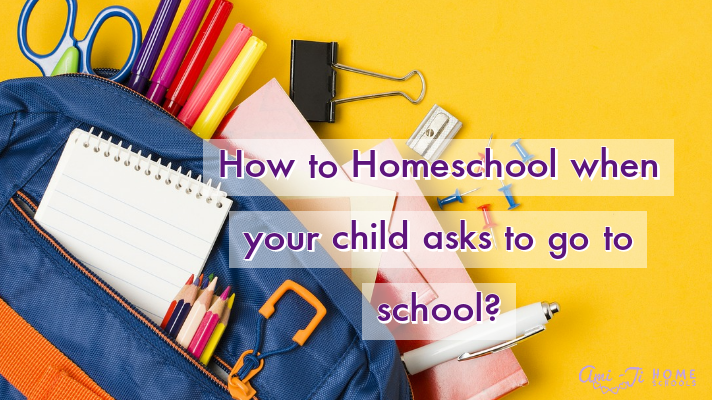Question:
My child feels insecure and wants to go to school after seeing other children going to schools with many facilities that we don’t have in our homeschool. Due to my own anxiety and guilt about this matter, when asked how long do I plan to homeschool, I responded by saying just a few more years. This made my child ask for conventional school more and made it harder for me to homeschool with purpose as I did before.
Answer:
This is a fairly common struggle in homeschooling families. Despite how isolated homeschooling children seem, it is inevitable that they will come across children amongst their family members or friends who go to school and have access to better facilities. There is no reason to hide from this scenario because to be able to overcome the comparison of our different lives gracefully is an important skill.
Here is how you can help your child navigate through these feelings while teaching them important values.
Don’t let them feel they are missing out
Identify what your child sees the other children doing that makes them feel that they are missing out. Most of the time it’s something we can easily arrange but because we tend to become slaves to our routines, we stop looking at all the other possibilities we have.
Allow your child to voice what they desire without giving in to your own anxiety. At times just an empathetic conversation is enough to help, “Did you like dress up day your cousins enjoyed at school? That looked exciting. We could definitely do a similar party for our homeschool.”
De-school
“We can get too easily bogged down in the academic part of homeschooling, a relatively minor part of the whole, which is to raise competent, caring, literate, happy people.” -Diane Flynn Keith
Since the homeschooling parents are usually a product of conventional schooling themselves, it is so easy for us to fall back and try to create a school at home. Like how we neglected our own happiness during childhood and raced for better grades, we end up projecting that on our children.
Pause and try to identify if the cause of your child’s dissatisfaction is due to the ‘boring’ and repetitive routines.
Design your OWN Homeschool
How did YOU want to homeschool? What was your mission? Not that of the neat Instagram Homeschooler, your co-op lady, friend or sister but your own unique desired outcome of homeschooling. If you didn’t think much of it before then it’s high time you determine your mission while considering your child’s personality, interests, strengths and weaknesses. Your homeschool should be unique to YOU and be flexible for your child learn and grow with. This way instead of feeling restricted, you can make your child feel their homeschool circumstances are unique to them.
“In the absence of clearly-defined goals, we become strangely loyal to performing daily trivia until ultimately we become enslaved by it.” Robert A. Heinlein.
Your Own Insecurities
A homeschooled child calling out, “I want to go to school like so and so…” should not have to agitate the mother unless she is also insecure about her homeschooling. It is your own insecurity that allows homeschool guilt to plague you. There is no doubt that as a parent, you would do your best to be able to give your child an ideal education. You are a responsible, committed, passionate and a brave parent, because such is the reality of those who choose to tread this bumpy road. The fact that your child’s unhappiness in being homeschooled irritates does not mean that you are lacking but that you want to ensure your child is happy with best possible education.
Embrace your insecurities instead of trying to hide them, give them a thorough look and keep them close to your heart. Every single thing you believe your child is missing out on because you homeschool them is true and it WILL BE that way.
And then…
Look at the things and opportunities your child is GAINING by being homeschooled. List them up and treasure them more closely than the nagging guilt that may probably never go.
Gratitude
This situation is a perfect time for you to teach gratitude that would help your child navigate through life smoothly. A positive person is able to look beyond the hurdles of what they don’t have and can’t do to the paths open for them to choose from. There is no need to shame a child wanting something else but rather this becomes an opportunity to shape their attitudes toward not just homeschooling confidence but rather overall mentality. This is perhaps the best thing to teach to a child for homeschooling isn’t just finishing books and activities but rather the making of wholesome human.
If you have any more questions, please reach out below.




 Protected by Patchstack
Protected by Patchstack